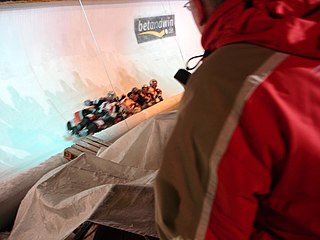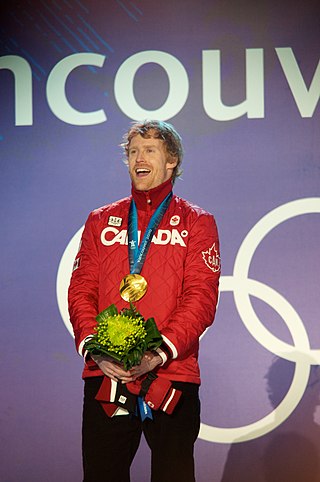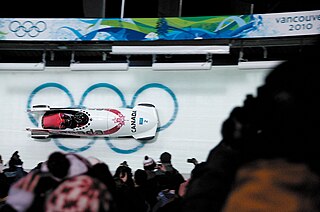
Skeleton is a winter sliding sport in which a person rides a small sled, known as a skeleton bobsled, down a frozen track while lying face down and head-first. The sport and the sled may have been named from the bony appearance of the sled.

Martins Dukurs is a former Latvian skeleton racer, currently a coach, who has competed since 1998. He is a six-time world champion in men's skeleton, a double Olympic silver winner, and the athlete with the most World Cup titles with a total of 11, having won eight consecutive titles between 2010 and 2017, plus another three consecutive titles between 2020 and 2022.

Mellisa Hollingsworth is a retired Canadian athlete who competed from 1995 to 2014. She won the bronze medal in the women's skeleton event at the 2006 Winter Olympics in Turin.
Aoife Hoey is an Irish bobsledder who has competed since 2004. She finished 22nd out of 23 in the two-woman event at the 2005 FIBT World Championships in Calgary. At 6 ft 4 in (1.93 m), she was the tallest woman at the 2010 Winter Olympics.
The FIBT World Championships 2009, officially known as the Bauhaus FIBT Bobsleigh & Skeleton World Championships, February 20 to March 1, 2009, at the bobsleigh, luge, and skeleton track in Lake Placid, New York, for the ninth time, doing so previously in 1949, 1961, 1969, 1973, 1978, 1983, 1997 (skeleton), and 2003. Lake Placid was chosen 25–11 over Igls, Austria.

The Königssee bobsleigh, luge, and skeleton track is a venue in Germany for bobsleigh, luge and skeleton, located in Schönau am Königssee, Bavaria, near Königssee and the border with Austria. Completed 57 years ago in 1968, it is the first permanent, artificially refrigerated bobsleigh, luge, and skeleton track in the world. In July 2021, the track was severely damaged by the floods that affected the European continent, and is currently under reconstruction.

The Olympic Sliding Centre Innsbruck is a venue for bobsleigh, luge and skeleton located in Igls, Austria. The most recent version of the track was completed in 1975 and is the first permanent, combination artificially refrigerated bobsleigh, luge, and skeleton track, serving as a model for other tracks of its kind worldwide. It hosted the bobsleigh, luge, and skeleton competitions for the 2012 Winter Youth Olympics.

Jonathan Riley "Jon" Montgomery is a Canadian skeleton racer and television host. He won the gold medal in the men's skeleton event at the 2010 Winter Olympics in Vancouver, British Columbia. Despite hosting The Amazing Race Canada since 2013, he is best known in Canada for his spontaneous celebration after winning the gold medal in 2010, when he was caught on camera being handed a pitcher of beer by a fan while a crowd surrounding him cheered and sang O Canada. Writing for CBC in 2020, Montgomery stated "If the beer is all I’m ever remembered for, I consider myself the luckiest fella on Earth."

The Sigulda Bobsleigh and Luge Track is located in Sigulda, Latvia, built in 1986. Currently, the track manager is Dainis Dukurs, former bobsleigh brakeman and the father of skeleton racers Martins and Tomass Dukurs.

The Whistler Sliding Centre is a Canadian bobsleigh, luge, and skeleton track located in Whistler, British Columbia, that is 125 km (78 mi) north of Vancouver. The centre is part of the Whistler Blackcomb resort, which comprises two ski mountains separated by Fitzsimmons Creek. Located on the lowermost slope of the northern mountain, Whistler Sliding Centre hosted the bobsleigh, luge, and skeleton competitions for the 2010 Winter Olympics.
The skeleton competition of the Vancouver 2010 Olympics was held at Whistler Sliding Centre. The events were held between the 18 and 19 February 2010. This event was expanded to four runs over two days beginning at these Olympic Games.

The Men's large hill individual ski jumping competition for the 2010 Winter Olympics in Vancouver, Canada was held at Whistler Olympic Park in Whistler, British Columbia. It started on 19 February and ended on 20 February. Austria's Thomas Morgenstern was the defending Olympic champion in this event. Andreas Küttel of Switzerland was the defending world champion in this event. Two test events took place at the Olympic venue on 24–25 January 2009, both won by Austria's Gregor Schlierenzauer. On the 25th, Schlierenzauer set the hill jumping record with a jump of 149.0 metres (488.8 ft) which was also tied by Finland's Ville Larinto. The last World Cup event in this format prior to the 2010 Games took place on 6 February 2010 in Willingen, Germany and was won by Schlierenzauer.

The two-man bobsleigh competition at the 2010 Winter Olympics in Vancouver, British Columbia, Canada, was held at the Whistler Sliding Centre in Whistler, British Columbia on 20–21 February. The German team of André Lange and Kevin Kuske were the defending Olympic champions in this event. Switzerland's team of Ivo Rüegg and Cedric Grand were the defending world champions in this event. The test event held at the Olympic venue was won by the German duo of Thomas Florschütz and Marc Kühne. The last World Cup event prior to the 2010 Games took place in Igls, Austria on 23 January 2010 and was won by the Swiss duo of Beat Hefti and Thomas Lamparter while Rüegg won the overall World Cup in the two-man event.

The four-man bobsleigh competition at the 2010 Winter Olympics in Vancouver, British Columbia, Canada, was held at the Whistler Sliding Centre in Whistler, British Columbia, on 26–27 February. The German team of André Lange, René Hoppe, Kevin Kuske, and Martin Putze were the defending Olympic champion in this event. America's team of Steve Holcomb, Justin Olsen, Steve Mesler, and Curtis Tomasevicz were the defending world champions in this event. The test event was won by the Latvian team of Jānis Miņins, Daumants Dreiškens, Oskars Melbardis, and Intars Dambis. The last World Cup event prior to the 2010 Games place took place in Igls, Austria on 24 January 2010 and was won by the German team of Lange, Hoppe, Kuske, and Putze. Holcomb of the United States won both the four-man and the combined World Cups.

The two-woman bobsleigh competition at the 2010 Winter Olympics in Vancouver, British Columbia, Canada, was held at the Whistler Sliding Centre in Whistler, British Columbia, on 20–21 February.

The women's skeleton event at the 2010 Winter Olympics took place at the Whistler Sliding Centre on 18–19 February. The competition was won by British athlete Amy Williams, who set new course records for the track on her first and third runs. Williams, who had never before won a World Cup or World Championship event, became the first British athlete to win a solo Winter Olympic gold medal in 30 years. German sliders Kerstin Szymkowiak and Anja Huber won the silver and bronze medals respectively. Williams' teammate Shelley Rudman, who had won the silver medal at the 2006 Winter Olympics, and Canadian Mellisa Hollingsworth, both of whom had been expected to be in medal contention, were disappointed.
The men's luge at the 2010 Winter Olympics took place on 13–14 February 2010 at the Whistler Sliding Centre in Whistler, British Columbia. Germany's Felix Loch was the two-time defending world champion and won the gold medal with the fastest time in each of the four runs. The test event that took place at the venue was won by Germany's David Möller, who would win the silver medal in this event. Italy's Armin Zöggeler was the two-time defending Olympic champion and won a bronze medal in this event. The last World Cup event prior to the 2010 games took place in Cesana, Italy on 30 January 2010 and was won by Zöggeler, who also won the overall World Cup title.

The women's luge at the 2010 Winter Olympics in Vancouver, Canada took place on 15–16 February at the Whistler Sliding Centre in Whistler, British Columbia. Germany's Sylke Otto was the two-time defending Olympic champion. Otto retired midway through the 2006-07 season in January 2007 to pregnancy and after suffering a crash at the track in Königssee, Germany. Erin Hamlin of the United States was the defending world champion. The test event that took place at the venue was won by Germany's Natalie Geisenberger. The last World Cup event prior to the 2010 games took place in Cesana, Italy on 31 January 2010 and was won by Geisenberger. Geisenberger's teammate Tatjana Hüfner, the defending Olympic bronze medalist, won the overall World Cup for 2009-10 season in women's singles.
The doubles luge event at the 2010 Winter Olympics was held on 17 February at the Whistler Sliding Centre in Whistler, British Columbia. Twenty teams participated. Austrian brothers Andreas and Wolfgang Linger, the defending Olympic and European champions, won the gold medal. The silver medal was also won by a pair of brothers, Andris and Juris Šics of Latvia. Germans Patric Leitner and Alexander Resch clinched the bronze medal after edging out Italians Christian Oberstolz and Patrick Gruber, who were in third place after the first run.
The 2013–14 Skeleton World Cup was a multi-race tournament over a season for skeleton. The season started on 29 November 2013 in Calgary, Canada, and ended on 25 January 2014 in Königssee, Germany. The World Cup was organised by the FIBT who also run World Cups and Championships in bobsleigh.















